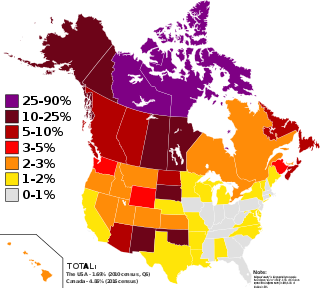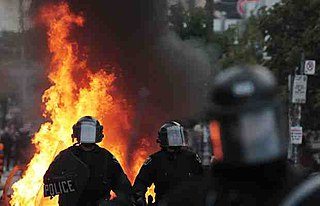
In Canada, Indigenous groups comprise the First Nations, Inuit, and Métis. Although Indian is a term still commonly used in legal documents, the descriptors Indian and Eskimo have fallen into disuse in Canada, and most consider them to be pejorative. Aboriginal peoples as a collective noun is a specific term of art used in some legal documents, including the Constitution Act, 1982, though in most Indigenous circles Aboriginal has also fallen into disfavour.
First Nations is a term used to identify Indigenous Canadian peoples who are neither Inuit nor Métis. Traditionally, First Nations in Canada were peoples who lived south of the tree line, and mainly south of the Arctic Circle. There are 634 recognized First Nations governments or bands across Canada. Roughly half are located in the provinces of Ontario and British Columbia.
The Oka Crisis, also known as the Kanehsatà:ke Resistance, was a land dispute between a group of Mohawk people and the town of Oka, Quebec, Canada, which began on July 11, 1990, and lasted 78 days until September 26, 1990, with two fatalities. The dispute was the first well-publicized violent conflict between First Nations and provincial governments in the late 20th century.

An inuksuk or inukshuk is a type of stone landmark or cairn built by, and for the use of, Inuit, Iñupiat, Kalaallit, Yupik, and other peoples of the Arctic region of North America. These structures are found in northern Canada, Greenland, and Alaska. This combined region, north of the Arctic Circle, is dominated by the tundra biome and has areas with few natural landmarks.

The Elsipogtog First Nation, formerly called the Big Cove Band, is a Miꞌkmaq First Nations band government in New Brunswick, Canada. The First Nation's territory comprises Richibucto Reserve #15, lying 8 kilometres (5.0 mi) southwest of Rexton, New Brunswick on the Richibucto River off of Route 116. It also comprises Soegao Reserve #35, lying 5 kilometres (3.1 mi) west of Moncton, New Brunswick. As of April 2016, the registered Elsipogtog population is 3,313, with 2,587 living on reservations and 726 living off reservations.

The Grand River land dispute, also known as the Caledonia land dispute, is an ongoing dispute between the Six Nations of the Grand River and the Government of Canada. It is focussed on lands along the length of the Grand River in Ontario known as the Haldimand Tract, an 385,000 hectares tract that was granted to Indigenous allies of the British Crown in 1784 to make up for territorial losses suffered as a result of the American Revolutionary War and the Treaty of Paris (1783). The Six Nations were granted the land in perpetuity and allege that lands were improperly sold, leased or given away by various Canadian governments, leaving only 5 per cent of the original lands under Six Nations control. The Six Nations also allege that monies owed to the Six Nations from leases and loans on much of the tract have not been paid or were redirected into government coffers.

Law enforcement in Canada is the responsibility of police services, special constabularies, and civil law enforcement agencies, which are operated by every level of government, some private and Crown corporations, and First Nations. In contrast to the United States or Mexico, and with the exception of the Unité permanente anticorruption in Quebec and the Organized Crime Agency of British Columbia, there are no organizations dedicated exclusively to the investigation of criminal activity in Canada. Criminal investigations are instead conducted by police services, which maintain specialized criminal investigation units in addition to their mandate for emergency response and general community safety.
Shawn Brant is a Native activist who lives on the Tyendinaga Mohawk Territory, Ontario, Canada. He has been involved in direct action struggles for Native land rights, in conflict with Ontario provincial authorities.

The Truth and Reconciliation Commission of Canada was a truth and reconciliation commission active in Canada from 2008 to 2015, organized by the parties of the Indian Residential Schools Settlement Agreement.
The imagineNATIVE Film + Media Arts Festival is the world's largest Indigenous film and media arts festival, held annually in Toronto in the month of October. The festival focuses on the film, video, radio, and new media work of Indigenous, Aboriginal and First Peoples from around the world. The festival includes screenings, parties, panel discussions, and cultural events.

Public protesting and demonstrations began one week ahead of the 2010 G20 Toronto summit, which took place in Toronto, Ontario, Canada on 26−27 June. The protests were for various causes, including poverty and anti-capitalism.
The Sixties Scoop was a period in which a series of policies were enacted in Canada that enabled child welfare authorities to take, or "scoop up," Indigenous children from their families and communities for placement in foster homes, from which they would be adopted by white families. Despite its name referencing the 1960s, the Sixties Scoop began in the mid-to-late 1950s and persisted into the 1980s.

According to the latest available data, Statistics Canada estimates 4,157 suicides took place in Canada in 2017, making it the 9th leading cause of death, between Alzheimer's disease (8th) and cirrhosis and other liver diseases (10th). In 2009, there were an estimated 3,890 suicide deaths.

Idle No More is an ongoing protest movement, founded in December 2012 by four women: three First Nations women and one non-Native ally. It is a grassroots movement among the Indigenous peoples in Canada comprising the First Nations, Métis and Inuit peoples and their non-Indigenous supporters in Canada, and to a lesser extent, internationally. It has consisted of a number of political actions worldwide, inspired in part by the liquid diet hunger strike of Attawapiskat Chief Theresa Spence and further coordinated via social media. A reaction to alleged legislative abuses of Indigenous treaty rights by then Prime Minister Stephen Harper and the Conservative federal government, the movement takes particular issue with the omnibus bill Bill C-45. The popular movement has included round dances in public places and blockades of rail lines.

Racism in Canada traces both historical and contemporary racist community attitudes, as well as governmental negligence and political non-compliance with United Nations human rights standards and incidents in Canada. Contemporary Canada is the product of indigenous First Nations combined with multiple waves of immigration, predominantly from Europe and in contemporary times, from Asia.

The Culbertson Tract Land Claim, located in the Canadian Province of Ontario in Hastings County, is a specific land claim originally submitted by the Mohawks of the Bay of Quinte in 1995. It covers 923 acres surrounding the Tyendinaga area and the majority of the Deseronto township. This claim is based on the loss of over 800 acres of land during the continued loyalist settlement during 1820-1843 which proved to be the loss of the majority of the land from the Simcoe Treaty.

The Coastal GasLink pipeline is a TC Energy natural gas pipeline under construction in British Columbia, Canada. Starting in Dawson Creek, the pipeline's route crosses through the Canadian Rockies and other mountain ranges to Kitimat, where the gas will be exported to Asian customers. Its route passes through several First Nations peoples' traditional lands, including some that are unceded. Controversy around the project has highlighted important divisions within the leadership structure of impacted First Nations: elected band councils established by the 1876 Indian Act support the project, but traditional hereditary chiefs of the Wetʼsuwetʼen people oppose the project on ecological grounds and organized blockades to obstruct construction on their traditional land.
The following is a timeline of the 2020 Canadian pipeline and railway protests which originated with the opposition by the hereditary chiefs of the Wetʼsuwetʼen people in British Columbia (BC), Canada to the Coastal GasLink Pipeline project.
From January to March 2020, a series of civil disobedience protests were held in Canada over the construction of the Coastal GasLink Pipeline (CGL) through 190 kilometres (120 mi) of Wetʼsuwetʼen First Nation territory in British Columbia (BC), land that is unceded. Other concerns of the protesters were Indigenous land rights, the actions of police, land conservation, and the environmental impact of energy projects.

The United Nations Declaration on the Rights of Indigenous Peoples Act is a law enacted by the Parliament of Canada and introduced during the second session of the 43rd Canadian Parliament in 2020. The legislation establishes a legal framework and timeline to bring Canadian law into alignment with the United Nations' Declaration on the Rights of Indigenous Peoples (UNDRIP).













